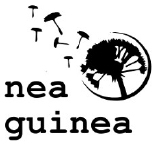Partners
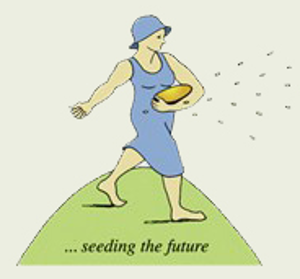
Blue Mountains Permaculture Institute
The Blue Mountains Permaculture Institute was founded in 2009 by Rosemary Morrow and Lis Bastian, in the Blue Mountains of Australia, two women with extensive experience in education, research and human community development. The institute specializes in developing informal educational processes that are accessible to all and offer strategies for developing social, environmental and economic resilience. Rosemary Morrow studied agricultural science at the University of Sydney, rural sociology at the Sorbonne in Paris, development at Reading in England and horticulture at TAFE, but after spending time in Africa she realised she needed a better alternative to conventional farming practices. He found this alternative in the ethical principles and applied science of Permaculture and has been teaching and promoting it in practice ever since. He is the author of several books such as ‘The Earth User’s Guide to Permaculture’ and ‘The Earth User’s Guide to Teaching Permaculture’ which have been translated into many languages. For more than 40 years Rosemary has worked with farmers and villagers in Africa, Central and Southeast Asia and Eastern Europe. She has also devoted much of her energy to people in countries that have experienced war such as Vietnam, Cambodia, Uganda, Ethiopia, Afghanistan and Timor-Leste, and to communities facing the effects of climate change such as the Solomon Islands. Finally, he has worked with communities in Spain and Portugal that are facing the effects of the global economic crisis. Lis Bastian has a long experience in education, community development, arts and ecology. She started teaching Permaculture in 2008 with Rosemary Morrow and they have been working together at the Institute ever since.
New Guinea has collaborated with Rosemary Morrow from the Blue Mountains Permaculture Institute and Tina Lyberis to organize a two-day PDC (Permaculture Desing Course) at our farm in Nea Makri, with thirty participants from Greece and abroad.
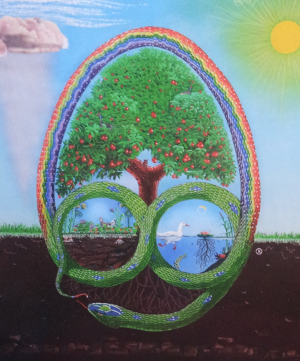
Applewood Permaculture Centre
Applewood Permaculture Centre is located in the Golden Valley of Herefordshire, England, where Chris Evans and Looby Macnamara are working to regenerate the lifestyle, livelihood and landscape. Chris Evans and Looby Macnamara are already collaborating on the Designed Visions project which is a partnership of Permaculture designers and educators that aims to build momentum towards a greener and more sustainable lifestyle using the design and educational tools that Permaculture offers. The objectives of the Applewood Permaculture Centre are multiple and include: Demonstration – The installation and maintenance of sustainable applications that demonstrate a range of good practices for appropriate, resilient and low hydrocarbon land use, construction and energy management in small, medium and large scale applications, Adult Education – The provision of educational programmes on the process of installing and maintaining sustainable applications located on the estate, the provision of educational programmes on systems of care for people that encourage personal development
New Guinea is working with Chris Evans on the Diploma in Permaculture from the Permaculture Association of England, and periodically provides design advice for the farm in New Guinea.
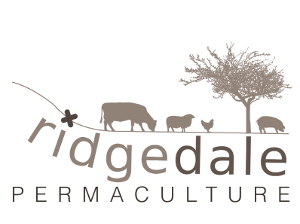
Ridgedale Permaculture
Ridgedale Permaculture is a project of local food production and educational activities. It promotes the next generation of young farmers to start working on the land in a profitable way through focused educational experiences. Their farm is located on the 59th parallel in Sweden, where they present and train on Permaculture Farm Design, Regenerative Agriculture, Keyline Design, Forestry, Holistic Management, No-tillage Vegetable Marketing, Grazing-based Commercial Livestock and Poultry Marketing. Their primary goal is to regenerate the landscape, ecosystems and soil through a resilient, multi-scale, reproducible and profitable agribusiness. Their secondary objective is to educate, facilitate, inform and empower people to take action through regenerative planning and holistic decision-making to strengthen the local economy, local resilience and local communities. Richard Perkins, co-owner and principal designer of the project, is a renowned Permaculture trainer and farmer and the author of the book ‘Making Small Farms Work’. He has worked professionally in every major climate zone on many continents as a consultant for projects, farms and industrial applications and has organized more than 40 Permaculture Design Course (PDC) seminars, as well as dozens of specialized seminars and practical workshops. He focuses on helping others to design regenerative agriculture projects and has worked with ventures on a variety of topics, from socially supported agriculture (SSA) to large-scale farm design, from forestry to water retention and irrigation systems, from regenerative enterprise design to Keyline design, and from holistic grazing design to community empowerment.
New Guinea has received from Ridgedale Permaculture and Richard Perkins a two-month subsidized internship on his farm in Sweden, during which he was immersed in holistic farm management based on Permaculture principles.
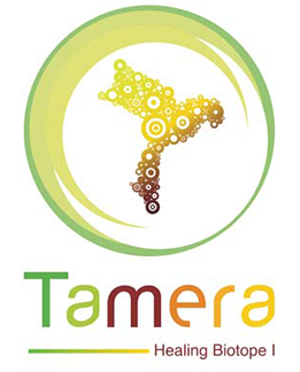
Tamera - Healing Biotope I
Healing Biotope I Tamera is a peace research project with the aim to create a model of a future society free of hatred, lies, violence and fear. Tamera wants to become a compelling point of peace, a hothouse of trust, a prototype for an existence on this planet free of fear, a post-capitalist social model and a place where the human and the non-human come together. Since 1978, when the idea was first conceived and the organisation was founded, the Healing Biotopes project has gone through many phases of development and new beginnings, until Tamera was founded in southern Portugal in 1995, on an area of 330 hectares. Today 170 people live and work there and are connected to an international network and bases in many countries such as Israel-Palestine, Colombia, Brazil and Kenya. The founding idea was to develop a non-violent model of cooperation between humans, animals and nature. It soon became clear that the healing of love and human community had to be at the centre of this process. Sexuality, love and companionship must be freed from lies and fear, or there can be no peace on Earth if there is a war on love. Ecological and technological research in Tamera includes the application of water retention systems in the local ecosystem to heal the environment, as well as a model of peripheral energy and food autonomy. Through the Global Campus and the Terra Nova School they are working within a global network aiming at the social, ecological and ethical foundation of a new Earth, Terra Nova.
New Guinea has received a subsidized participation from Tamera in a ten-day landscaping seminar on water retention on their site in Portugal.
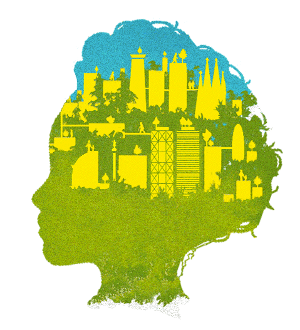
Permaculture Barcelona
Permaculture Barcelona is a living organisation dedicated to ecological and social transformation, emphasising empowerment and development through resilience. It is inspired by the principles of Permaculture planning (Care for People, Care for the Earth and Equitable Resource Allocation) and seeks to engage the local community in a collective process with the aim of active participation. It operates in the context of networking with other projects and people, proposing various theoretical and practical actions to create a new paradigm of a society that is resilient, cooperative and in harmony with its environment. Permaculture Barcelona is a group formed in the city and is made up of people who want to learn and share the theory and practice of Permaculture in an urban centre. Already since its foundation in 2012, the group has organised several series of educational seminars and talks, film screenings, excursions and practical activities in Barcelona. In particular, the group has started two forest gardens, one in Can Masdeu and one in Ecodharma. One of the key members of the organisation is Alfred Decker who has specialised in training Permaculture trainers having apprenticed for many years under Rosemary Morrow.
New Guinea collaborated with Permaculture Barcelona to hold a three-day seminar on the basic principles and practices of Permaculture with Alfred Decker, at the New Guinea site in St. Artemius in Pagrati.
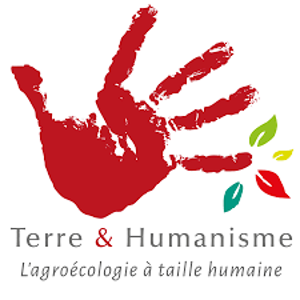
Association Terre et Humanisme
The Association Terre et Humanisme was founded in 1994 in France under the name ‘Friends of Pierre Rabhi’ and renamed in 1999 as ‘Earth and Humanism’. The organization works to promote agroecology as a practice and ethic for the improvement of the human condition and its natural environment and considers respect for Mother Earth and the food self-sufficiency of peoples in their own land as a prerequisite for any balanced and sustainable society. The organisation is mainly active in France, around the Mediterranean and in West Africa on the basis that farmers everywhere face the same problems and challenges in the struggle to ensure their food self-sufficiency. With the exchange programmes of agro-ecology trainers between the North and the South, the organisation promotes the change of farming practices and the social paradigm in general. Agro-ecology is a practice that has ecological benefits such as organic fertilization of soil, optimization of water use, respect and protection of biodiversity and combating desertification and erosion; economic benefits such as transport savings and relocation of the economy at the local level; and social benefits such as production of quality food, nutritional self-sufficiency of individuals and stabilization of populations on their land, enhancement of the role of farmers in society and strengthening of social ties. Beyond a simple agricultural practice, the Association Terre et Humanisme believes that Agroecology is a rebellion of consciences that could well be the cause of a great social transformation.
New Guinea in collaboration with the Association Terre et Humanisme organized a five-day introductory seminar on the basic principles and practices of Agroecology with Valerie Vaneste and Jonathan Peat, at the farm in Nea Makri.
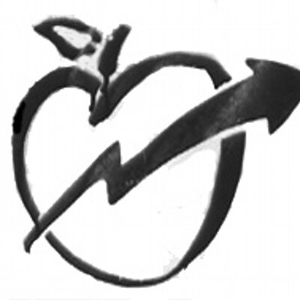
Can Masdeu
The valley of Can Masdeu is a network of ventures that resists, with the rhythm of the seasons, the voracity of the city without limits. It is a creative action of disobedience in a world of profit, smoke, noise and speed. A proposal for collective collaboration and coexistence between generations, at the foot of the Collserola hills and rooted in the Nou Barris neighbourhood of Barcelona. The valley consists of 35 hectares of land that is part of the Collserola National Park and property of the Sant Pau Hospital. However, from the point of view of use, the active management of this suburban area by the collective projects of the neighbourhood since 2001 has re-rented the space and turned it into a place for agricultural and social work. The network of five valley projects mobilises hundreds of people and believes that the land belongs to those who work it. The network is committed to the agro-political defence of the Collserola hills and claims the management of the valley, but believes that the site is a public natural resource, a re-appropriation of common goods from a free market logic, self-managed by the local community. It all started at Christmas 2001. A few hours after the occupation of the old hospital, its administration started legal procedures to evict the squatters, resulting in an unsuccessful attempt to evacuate the site a few months later. During the non-violent and theatrical resistance of the squatters, the Barcelona city council came under heavy pressure from the city’s citizens’ movements and decided that ‘legal procedures for eviction were not appropriate’. Those words have of course been taken by the wind over the years, after the city council’s repeated attempts to evacuate Can Masdeu’s project in the Collserola Valley.
New Guinea has visited the Can Masdeu project in Barcelona to exchange experiences and during her stay there she organised an open hands-on soap making workshop. Members of Can Masdeu have also visited our project in Athens and Nea Makri.
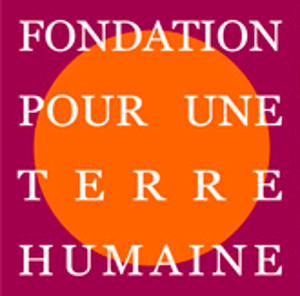
Fondation pour une Terre Humaine
The Foundation for a Human Earth(Fondation pour une Terre Humaine) has for many years supported ecological struggles in Europe and other parts of the world. Now its objectives are to promote alternative relationships between all living beings based on respect and mutual aid between Man, Animals and Plants, and to support small communities that organise themselves to live autonomously, in solidarity, respecting and cooperating with the environment. The foundation was founded in 2001 in Switzerland by a small group of ecologically-minded people and is funded by donations from individuals and does not receive government grants or donations from partners.
New Guinea has partnered with the Fondation pour une Terre Humaine to complete the infrastructure of the hospitality area in Nea Makri and for various on-farm applications such as vegetable gardens and windbreaks.
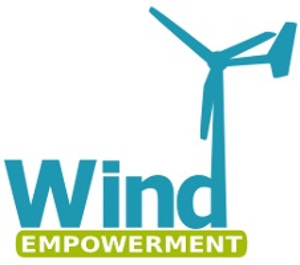
wind empowerment
The Wind Empowerment network is active in the development of small, locally built wind turbines for the electrification of rural communities. The organisation consists of 37 organisations in 28 different countries and has a wide range of members including small wind turbine manufacturers, associations, NGOs, universities, social enterprises, cooperatives, cooperatives, pilot test sites and 1,146 members. The Wind Empowerment network is based in the UK and operates as a non-profit organisation, and is essentially a platform for the exchange of knowledge and expertise that connects all members and participants. Each member can share their experiences of what works and what doesn’t in the environment in which the technology is applied, or technical developments and other information, helping to make small wind turbines a more affordable technology that is sustainable enough to provide an answer to the problem of rural electrification in the global South. The network was founded in 2011 at the World Social Forum in Dakar, Senegal, and since then it has created a website that presents the activities of the network and its members, with several working groups and general discussion forums on topics such as technology, education and maintenance of small wind turbines. Most members of the network use Hugh Piggott’s designs from ‘A Wind Turbine Recipe Book’ for the local construction of small wind turbines, and work together to improve and enlarge them.
New Guinea has been a member of the Wind Empowerment network since its inception and works with many of its members. In November 2014, New Guinea co-hosted the second international meeting of the network in Athens with 17-hour participants, and participated in the third meeting of the network in Patagonia in November 2016. New Guinea participated in a Wind Empowerment rural electrification project in Ethiopia, in which small wind turbines were built by technical students and installed in rural communities to provide electricity for basic lighting and cooling needs.

Scoraig Wind Electric
Scoraig Wind Electric is the name of Hugh Piggott’s renewable energy company. Hugh was born in Scotland in 1952 and after spending a few years in East Africa he lived in Edinburgh. After graduating from Cambridge University in 1974 with a degree in Mathematics and Psychology, he decided to return to earth and moved to the remote peninsula of Scoraig in south-west Scotland, where he still lives today. Scoraig is a windy place with no electricity grid, so using wind power to charge batteries is an ideal option. Starting from a very simple everyday life without electricity, Hugh learned to harness the wind to generate electricity. In 1978 he came into contact with wind turbines and since then he has been using the wind and the sun to generate electricity at home. He has designed, built and sold wind turbines with blade diameters from 1m up to 4.5m, which generate electricity for the population of Scoraig (about 100 people) and beyond. In the early 1980s, Hugh began writing about his experiences with wind turbines and published a few booklets, while also starting to work with commercial wind turbine manufacturers, testing and developing their turbines in the demanding conditions of Scoraig. He started working with the Centre for Alternative Technology in Wales where he taught twice a year at their wind energy seminars and started publishing books such as the ‘Windpower Workshop’ and ‘A Wind Turbine Recipe Book’. Hugh runs small wind turbine building workshops in Scoraig and previously and in many parts of the world. Its simple designs, available without patents, have been adopted by groups in many countries in the developing and developed world, and are used by the international organisation Wind Empowerment, a network to promote locally built small wind turbines for rural electrification.
New Guinea has worked with Hugh Piggott to organise small wind turbine construction seminars in Scoraig by sending instructors for support, and has participated in many wind turbine maintenance and training seminars held there.
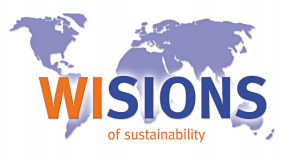
WISIONS of sustainability
‘WISIONS of sustainability‘ is an initiative of the Wuppertal Institute in Germany supported by the Swiss ProEvolution Foundation. The organisation’s main goal is to make clean energy a primary solution for meeting basic electricity needs in developing regions, helping its partners to identify successful examples and scale them up through local networking, appropriate promotion and success stories. The activities of WISIONS that support its objective are: the Sustainable Energy Handbook Support – the practical application and testing of technologies and models that have the potential to be replicated on a larger scale, the Local Partnerships and Networks – the development of technologies on a larger scale and the Technology Radar & Research – identifying promising technologies and models that could be deployed on a larger scale. The WISIONS initiative has been actively promoting the introduction of sustainable energy solutions and natural resource management since its creation in 2004. During these years, the organisation has established itself by developing more than 120 projects around the world and has learned a lot about the barriers that still exist and discourage the widespread dissemination of sustainable energy solutions and successful implementation models, especially in developing countries and developing economies.
New Guinea has collaborated with WISIONS in the SEPS projects ‘Sustainable Energy Handbook Support’ and specifically in the know-how transfer project ‘Online Tools for Locally Manufactured Small Wind Turbines’ where in November 2017, together with the organisation RurERG from Greece and the organisations KAPEG and PEEDA from Nepal, set up a small wind turbine manufacturing workshop at Kathmandu University and then installed a stand-alone hybrid PV and wind turbine system in the rural community of Mityal to power a clinic.
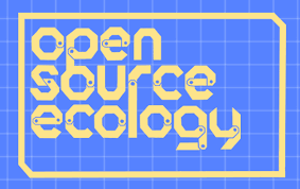
open source ecology
When Open Source Ecology was founded in 2003 by Marcin Jakubowski, the idea of a world where open source meets economy and ecology was born. This implies a prosperous world in which people live in harmony with the ecosystems that keep them alive. What is open source? Open source refers to a model of service and product delivery that includes the ability for the end user to participate in the production of these services and products. What is the open economy? The open economic model is based on free access to information, designs and means of production, and the aim is to extend the model to a multitude of products and services, and access to them to an increasing number of people. What is Open Source Ecology? The name comes from the idea of integrating natural, social and industrial ecology, with the aim of a sustainable and regenerative economy. In 2004, the organisation bought a 30-hectare piece of land near Kansas City, Missouri, USA. This is where the idea and the Factor e Farm (FeF) was born and since then they have been building facilities using as many open processes as possible, such as open software and hardware. FeF is more than just a farm, it is a place where ideas are grown and put into practice, a socio-technological experiment. One of the projects taking place at FeF is the Global Village Construction Set (GVCS) and its radically efficient and dispersed production methods, resulting in the production of industrial machines in the course of a day. The GVCS is a set of 50 basic machines that support the modern lifestyle, from a tractor to a bakery to an electronics production platform. The aim of the project is to design and build these machines using open source software and hardware, and to make their designs publicly available under patent-free open source hardware licenses.
New Guinea is working with Open Source Ecology and Marcin Jakubowski as part of the Open Building Institute project to design small wind turbines and open source hydro-generators for use on small farms and small crafts.
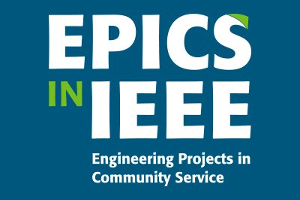
EPICS in IEEE
EPICS in IEEE is a program of the Institute of Electrical and Electronics Engineers (IEEE) that organizes secondary school students to get involved in electrical projects helping local humanitarian organizations. This strengthens the action of the organisations and their contribution to the local communities they work with. Through this process, students and pupils are asked to use their knowledge to solve technical problems that arise in the communities. More than 50 projects with social content have been implemented around the world, from developing mobile phones for medical applications to connecting rural schools with technology. EPICS in IEEE strives to empower the next generations through technological applications, with the aim of giving more opportunities to young people around the world.
New Guinea has collaborated with the IEEE student section of the National Technical University of Athens for the implementation of the project ‘Environmental Education and Renewable Energy for Schools in Greece’ during which interactive educational modules on climate change and the practical construction of a photovoltaic panel took place in schools in Athens and other places in Greece.
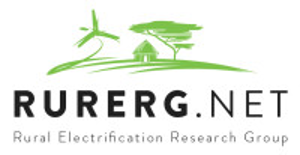
Rural Electrification Research Group (RurERG)
TheRural Electrification Research Group(RurERG) is a research group on rural electrification with renewable energy sources, consisting of members of the SmartRUE research group on smart grids and microgrids of the Electrical Engineering Department of the National Technical University of Athens. The team is mainly involved in rural electrification projects in the developing world and in the Greek countryside, while researching and promoting the use of open hardware technologies without patents. Since 2009, RurERG has initiated an experimental evaluation process based on international standards for locally manufactured small wind turbine technology, specifically those described in Hugh Piggott’s ‘A Wind Turbien Recipe Book’. In the context of this process, the research team has created experimental setups at laboratory level and in the field in real conditions, with the main objective to measure the performance and general performance of these small wind turbines, as well as their durability and reliability over time and in demanding environmental conditions. In addition, the research team has contributed to the development of a locally manufactured small hydro-generator, but also an open source data logger and open design tools for small wind turbines. RurERG is a member of the international network of locally built small wind turbines Wind Empowerment and had co-organized in Athens in 2014 the biennial meeting of the network, participates in international conferences on the commons and open source such as the FLOK (free, libre, open knowledge) Society meeting in Ecuador and participates in renewable energy installations in rural areas of the global South.
New Guinea has collaborated with the RurERG research team in both technological and social actions on energy. New Guinea has collaborated with the research team in technological applications such as renewable energy installations in Ethiopia and in the development and evaluation of a locally manufactured small hydro-generator, while on a social level it has collaborated in the co-organization of the international conference of the Wind Empowerment network in Athens in 2014 and in the organization of educational programs in high schools of the country, in the context of environmental education, with the construction of a photovoltaic panel by the students.
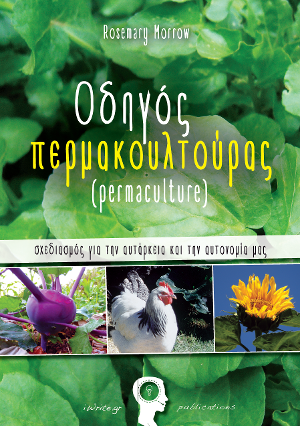
Permaculture Greece
The aim of Permaculture Greece is to spread permaculture and sustainability in Greece through quality educational programs, to inspire and support the creation of permaculture centers in Greece and to show how a holistic philosophy can give us the solutions we are looking for. The main orchestrator of the group’s actions is Tina Lyberi, permaculture consultant and translator of Rosemary Morrow’s book ‘Earth User’s Guide to Permaculture’. The “Guide to permaculture – planning for our self-sufficiency and autonomy”, as the Greek title reads, is the first complete guide to permaculture in Greek. This illustrated and easy-to-read guide shows us the basic design principles for self-sufficiency and autonomy. It shows us how to design a garden of any size, whether we live in a small urban apartment, a house with a garden, a rural area or anything else. The fundamental principle is simple: we give back to the Earth what we take to create a sustainable environment, while at the same time taking care of people, caring for the Earth, reducing our consumption of natural resources and redistributing the surpluses of our production.
New Guinea has collaborated with Tina Lyberis and Permaculture Greece to organize a two-day PDC (Permaculture Desing Course) at our farm in Nea Makri, with thirty participants from Greece and abroad and teacher Rosemary Morrow from the Blue Mountains Permaculture Institute in Australia.
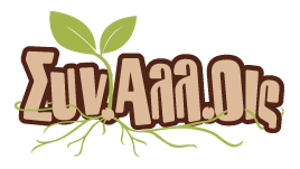
This is custom heading element
In the autumn of 2011, the non-profit Cooperative for the Solidarity Economy “Co-Allois” started its operation. It was born through a long process of internal consultation of the cooperative “the Seed”, where the need for better organization and support of the expanding network of distribution of alternative and solidarity trade products was identified. At the core of “Plus-Allis” is a working cooperative, which works to ensure that the coffee of the Zapatista movement and the other products of the struggling producers of the global South (sugar, cocoa, tea, etc.) reach as many people as possible, always based on the principles we have set in “Seed” in previous years. At the same time, it is a proposal for a creative, egalitarian and socially meaningful work in the face of the bleak labour landscape of our days. Apart from being a distribution centre on a national level, the Thiseio site also serves as a distribution point for the products. They also host a variety of Greek products, which are sourced directly from local producers and cooperatives, with the least possible financial burden for the public. But beyond the products, they also want the space to become a point of exchange of ideas and knowledge. In this context, they have designed the spacious loft of the space to host events and meetings, hoping to contribute to the birth of new initiatives.
New Guinea has collaborated with the “Co-Allis” cooperative to organise information events at their premises on various topics such as herbal medicine. Also the cooperative “Syn-Allis” has undertaken the organization of the bar at the festival for the home economy of self-sufficiency ‘Life Celebration’ organized by New Guinea periodically at venues in Athens.
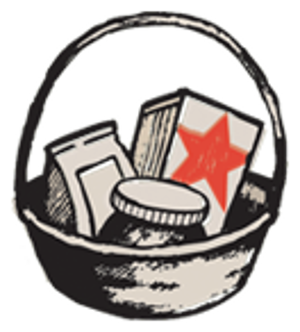
Grocery - Cafe Lacandona
The current solidarity trade movement was formed in Europe in the 1960s as a response to the free market conditions that allow multinational corporations and middlemen to make a high percentage of profit at the expense of producers, especially those from developing countries. This movement is a partnership of producers, organisations, traders and consumers based on dialogue, transparency, respect and fairness. It aims to empower marginalised producers in developing countries by defending their labour rights, the absence of middlemen, the prohibition of child and forced labour and the payment of fair wages. It also promotes sustainable development through the adoption of mild and organic farming methods. The Lacandona grocery store – café opened at the end of August 2011 with the idea to promote this movement. It supports small producers and cooperatives from Greece and around the world by offering their products in their store in the center of Athens.
New Guinea has collaborated with the Lacandona grocery – café to organize information events at their premises, on various topics such as herbal medicine and organic vegetable farming, as well as with the organization of presentations on urban farming. Also in Lacandona we have organized a birthday party for New Guinea and in general we have had a great time!
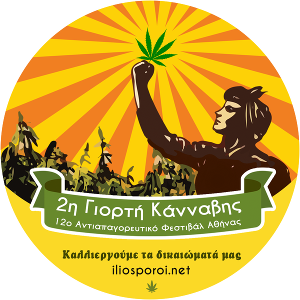
Sunflower Seeds Network
Heliospores is an information and activation network for young people aiming at the daily experience of ecology through self-action and collective action. They have been active since 2004, organising events to raise awareness among young people and citizens on issues related to quality of life, social demands and participation in decision-making. They are inspired by the values of the ecological movement: ecological wisdom and sustainability, social solidarity and respect for diversity, direct democracy and self-organised action. Their aim is to be the pony fly of Greek society, to operate in an anti-hierarchical way and to be always open to cooperation and initiatives. The Heliospores network is united by the precepts of social-radical ecology and autonomy, the vision of another society, ecological, free and self-managed. Indicatively, some thematic fields of involvement of the Heliospora are the reclamation of public space, anti-racist-anti-nationalist action, the coexistence of cultures and the abolition of borders as an antidote to nationalism-racism-xenophobia, non-violent civil disobedience, the creation of autonomous eco-communities, the abolition of compulsory military service and the refusal of conscription, free and responsible camping, decadence and critical consumption, the coexistence of art, ecological activism and collective awakening, the promotion of ecological lifestyles, a counter-advocacy approach to reduce the harm of addictions, free radio, mutants and nutrition, climate change and oil decoupling, the creation of ephemeral autonomous zones, and much more.
New Guinea has collaborated with the Sunflower Seeds Network in various projects such as its participation in the documentary ‘Another World’ produced by Sunflower Seeds, the pan-European project for training of trainers on degrowth entitled GROWL – Learning more, Growing less and the international training of trainers seminar entitled ‘Sustainability, Transition & Resilience’. Resilience – SUSTRARES) in Vlachia Evia, during which we organised workshops on autonomous renewable energy systems, herbal medicine and the preparation of herbal preparations and composting.
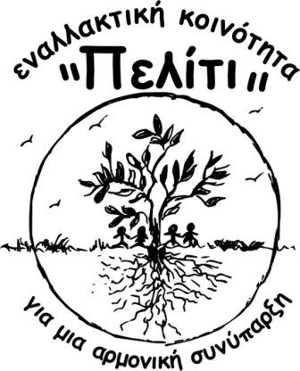
This is custom heading element
Peliti is engaged in the collection, conservation, dissemination and preservation of traditional varieties and the creation of an alternative community with the main focus on the preservation of these varieties. It is based in Mesochori in the Municipality of Paranesti in Drama, on an area of 6 acres and has 20 local groups in various regions of Greece and one in Bulgaria. Peliti gives free of charge small quantities of seeds of open-pollinated varieties to growers who then form a nationwide network for the preservation, dissemination and preservation of traditional varieties. Through Peliti’s annual ‘Local Farms’ publication, people who wish to plant seeds of traditional varieties can contact growers directly and obtain them. At the same time, Peliti has started the creation of a seed bank with the aim of extensively recording all the seed samples available in a database, their proper packaging and preservation and the renewal of the samples. Every year, the Panhellenic Traditional Variety Exchange Festival at the land of Peliti in Mesochori, is an occasion for a diverse crowd of people with a common vision of preserving traditional varieties to come together.
New Guinea has been working steadily with the Peliti network, either by supplying traditional varieties, which we in turn grow and promote, or by having its representatives participate in the events we organise. Specifically, New Guinea has collaborated with Kostas Tsigos from the local Peratia team in Lefkada to create the vegetable gardens of the farm in Nea Makri. We also regularly participate in the Panhellenic Traditional Variety Exchange Festival in the land of Peliti in Messochori, Drama.
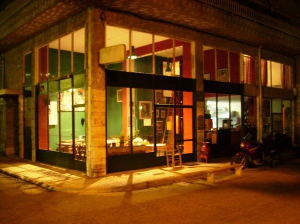
Co-operative Café of Plato's Academy
The Plato’s Academy Cooperative Café is a cooperative project that explores a different economic model of business that can be sustainable and healthy, a model of cooperative, environmentally friendly, social (non-profit) and solidarity economy. The space started operating in May 2010, after a year of internal processes, with the tool “European Village” and in the legal form of a non-profit civil society company. Through its operation, the café tries to promote the social and solidarity economy, direct and unmediated communication with the producer, products that respect the worker, the land and the environment and the reduction of the “ego” through cooperation, dialogue and consensus. Thus, the café can become an “urban laboratory” for the transition to an alternative economic model. Along with the activities of a café, it also functions as an open social space and a forum for events and discussion. As a result, many groups and organisations share the space for screenings, discussions, puppet theatre, experiential and practical workshops, exercises in the park opposite the café, musical evenings, vegetarian recipe presentations, among many others.
New Guinea often collaborates with the Plato Academy Cooperative Café, organizing events at its premises on a variety of topics such as vegetable processing and preservation, seed collection and conservation, and the organization of a collective kitchen with produce from our garden in Nea Makri. We also participate in networking meetings organised there on various topics such as alternative currencies, urban farming and the conservation of local seed varieties.
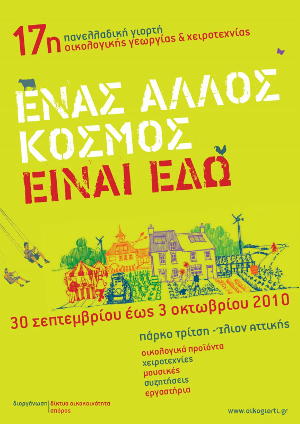
Network of Panhellenic Ecological Agriculture Festivals & Handicrafts
The institution of the Pan-Hellenic celebrations of ecological agriculture and handicrafts started in Thessaloniki in 1993. Since then, the ‘Eco-Festivals’ have been organized on an annual basis and have travelled all over Greece, leaving behind many local eco-festivals and a nationwide ecological network. The aim of the Eco-Gardens is to promote another way of life, which flows harmoniously, naturally and in solidarity, emphasizing ideas of support and cooperation, the direct relationship between producer and consumer, the organic relationship between people and their food, the local nature of products and clean quality food for all, promoting the reconnection between nature and society and the disconnection from the harsh commercialization of everything. The Ecovillages speak of Ecological Agriculture and not of organic commodities, because the primary aim of a production process of this type is not a pious certified treatment of the environment, but the creation of those cooperative structures that will set aside as many features of the capitalist market as possible. The Eco-Fairs are organized by the producers themselves and promote self-organization and direct democracy, the sharing of knowledge and experience, the direct relationship between producers and citizens without the mediation of third parties, the promotion of clean ecological products, their affordable and fair prices, small-scale production and cottage industry, processing with traditional methods, collective projects and partnerships.
New Guinea regularly participates in the Pan-Hellenic Celebrations of Ecological Agriculture & Handicrafts by organizing practical workshops and talks on issues of self-sufficiency in everyday life and by offering various products produced by the project from seedlings to natural cosmetics and soaps and from practical manuals to homemade beers. New Guinea has travelled with the EcoFestivals to various places in Greece, such as Chalkidiki, Thessaloniki, Xanthi, Chalkida, Volos, Heraklion and Athens.

Nomadic Kitchen
Nomadic Cuisine is a caravan of travellers. In their group they have the cooks, the funny, the grumpy, the sweet, the misfit and the adaptable and of course their pots and pans. Their journey starts from Plato’s Academy and from the collaborative Café, where they are the permanent tendency for movement, for contact and adventure. They believe that our senses accompany us permanently and form the basis for the mental states we experience and that a sense carries the energy of the person who created it. So their goal is to offer with taste and good mood colors, smells and flavors in every kind of celebration that beautifies the place and ourselves. To commune with those around them, not only with food but also with the broader concept of togetherness, because food for them means love, friends, music, celebration, art and communication. They want their raw materials to respect human labour, mother earth and the environment. The nomad may not know where he will eat the next day but wherever he is he will be with friends.
New Guinea has collaborated with Nomadic Kitchen to prepare the food for the ‘Life Celebration’ festival for the home economy of self-sufficiency that New Guinea organizes periodically at venues in Athens.
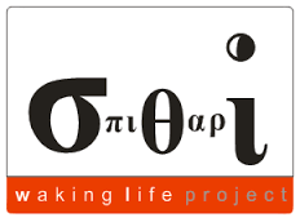
Spitfire - Waking Life
The group Spithari – Waking life, has started in 2010 the effort to restore a burnt area of pine forest in Marathon and transform it into a suburban eco-community. The goals of the group are to liberate the basic pillars of life (water, food, energy, shelter, love) through solidarity, cooperation, communalism and freedom of conscience. Most participants in the project spend a large part of their week there, and some stay permanently in caravans. A container workshop area (carpenter’s workshop etc.), a composting toilet, natural gardens, animals are kept and fruit trees have been planted. Recently, the operation of a model aquarium culture has started, while experiments are being carried out in the construction of domes and various structures that could be used in the daily life of an eco-community. The land is far from the electricity grid and basic daily electricity needs such as lighting, small fridge, laptops etc. are partly covered by a small 500W photovoltaic system, which has been granted to the group, and two small improvised wind turbines. The group stopped operating in Marathon in 2016 and its members are exploring alternatives to relocate the project to the countryside.
New Guinea has partnered with Spithari to install two locally made small wind turbines to enhance the electrification of the project.
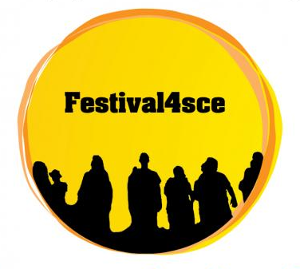
Solidarity & Solidarity Festival Cooperative Economy
The Solidarity & Solidarity Festival Co-operative Economy Festival started in 2012 as an annual meeting of people and projects that envision the economy in terms of solidarity and cooperation. It emerged from the emergence and development of more and more groups and networks of solidarity, waste and exchange economy all over Greece as well as work collectives. Taking action and participating in them proves to everyone that another world is not only possible but real. A world where the laws of the market and the existing economic system of exploiting human labour for profit are collapsing and where human relations are becoming meaningful anew. To date, the Solidarity & Solidarity Festival Cooperative Economy Festival has contributed in its own way to the development of the solidarity and cooperative economy in Greece and its consolidation in people’s consciousness as a reality. Hundreds of people are now actively involved in the sector of solidarity and cooperative production and thousands benefit from the product of this economy, which is not always material but also has social characteristics. It inspires and gives strength to our fellow human beings to fight in the struggle for survival while exuding an air of freedom that only the condition of solidarity can offer: man for nature and man. The festival is accompanied by workshops, lectures, screenings, events, discussions and artistic expression activities and attempts to give the impetus for participation, interconnection and communication to all those who consider autonomy, self-management and cooperativeness as non-negotiable values.
New Guinea participated in the co-organization of the first Solidarity & Solidarity Education Festival. Cooperative Economy in October 2012 and has since participated in many of the annual festivals by organizing informative events and practical workshops on energy, health and food self-management.

Centre for Natural Cultivation
The Natural Cultivation Centre was created by a group of volunteers in the summer of 1999 and is hosted in an area of five acres in Kissochori, Edessa. The main orchestrator of the centre is Panagiotis Manikis, who after getting acquainted with the person and work of the Japanese plant pathologist, philosopher and initiator of “natural farming” Masanobu Fukuoka, maintains and successfully develops a farm based on the principles of natural farming, located a few kilometres away from the Natural Farming Centre. The total area of the farm is 25 acres and it is both an orchard forest and a vegetable garden, where over 120 varieties of fruit trees together with forest trees and vegetables work in harmony. The objectives of the Natural Cultivation Centre are the creation of natural farms and vegetable gardens in Greece and abroad, the sowing of seeds for the revegetation of bare and barren mountains and deserts, the practical information of primary and secondary school students in the context of environmental education and the systematic collection of seeds for sowing in order to revegetate the mountains. At the same time, the Natural Cultivation Center organizes national and international festivals, as well as educational programs, so that as many people as possible can be practically informed on the methodology and techniques of Natural Cultivation.
New Guinea has collaborated with Panagiotis Manikis and the Centre for Natural Cultivation for tree planting of fruit trees and natural soil amendments at the farm in Nea Makri, and has co-organized with the Centre open events for Natural Cultivation at the same place.
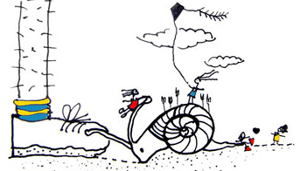
Snail Collective
Saligari is a group of people created in Athens in March 2009 out of the need to collectively explore the possibilities and techniques of building with natural materials. They choose self-education and collective work as their main tools. This is achieved through experimentation, the study of literature, but above all through open communication and the free exchange of knowledge and experiences with other individuals and collectives. They do not consider themselves experts, but self-taught masons. They are opposed to the logic of expensive seminars and the commercialisation of any tool for collective self-sufficiency. As self-managing individuals, they consider that knowledge should be freely transmitted, and are willing to share this knowledge through horizontal structures, in the context of social solidarity without the teacher-student relationship. The Saligari collective has collaborated with many other collectives in natural building constructions such as a small cob house in Navarino Park in Exarchia, a large cob house in Seta, Evia, a traditional wood oven in the occupation of the Prapopoulou estate in Halandri and in the occupied Agros territory in Tritsis Park.
New Guinea has collaborated with the Saligari collective to build a traditional wood-fired oven with natural materials on the farm in Nea Makri, as part of open events for natural building.
